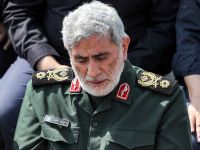On January 31, more than 12 years after that bitterly cold night above the Scottish town of Lockerbie, when Pan Am flight 103 exploded in midair, killing 259 people aboard the plane and 11 people on the ground, a Scottish court sitting in the Netherlands convicted a Libyan citizen, Abdelbaset Ali Mohammad Al Megrahi, to life imprisonment for his part in the bombing incident. Another Libyan national, Al-Amin Khalifa Fhimah, was acquitted by the court due to lack of damning evidence.
The focus of the Lockerbie disaster now shifts from the criminal into the political and economic arenas. At stake is the fate of two sets of sanctions against Libya — one imposed by the UN Security Council, and the other by the US government. Pressure on the US government to maintain the sanctions is considerable, and is for the most part being applied by the families of the bombing victims, who now plan to sue the Libyan government for damages.
However, managing US foreign policy today is a new Republican administration, which appears less inclined than its predecessor to make use of economic sanctions in order to pursue political goals. The administration is being pressured by the US oil industry, from which President George W. Bush himself emerged, to allow its members to compete for lucrative contracts in Libya.
On April 15, 1992, the UN Security Council imposed economic sanctions on Libya for refusing to extradite its two nationals, who had been accused of carrying out the attack. These sanctions included the grounding of all air traffic to and from Libya, a reduction in diplomatic relations and a ban on all arms sales to the country. The UN sanctions were extended in November 1993 to include a freeze on Libyan funds overseas, a ban on the sale of oil equipment for oil and gas export terminals and refineries, and tougher restrictions on civil aviation and the supply of arms.
The United States also imposed its own sanctions against Libya, essentially banning all commercial contacts with the North African nation. In August 1996, US government extended the US sanctions on Libya to cover foreign companies that make new investments of $40 million or more over a 12-month period in Libya's oil or gas sectors.
Two weeks after the Lockerbie trial verdict, a closed-door session of the UN Security Council heard representatives of the United States and Britain argue that action to lift sanctions against Libya should be suspended while they negotiated with Tripoli on the outstanding issues.
Following the session, Council President Said Bin Mustafa of Tunisia said that no action will be taken at this stage, so that the negotiations between Libya and the United States “can progress quickly and lead to a consensus solution to this question of the definitive lifting of the sanctions."
The United States and Britain have essentially reduced their demands on Tripoli to an acceptance of responsibility by Libya for the bombing and the payment of compensation to the victims' families. However, Libya is denying that Al-Megrahi was working for its intelligence service. "What's the connection between him and the Libyan intelligence agency? None at all," said the Libyan ambassador to the United Nations, Abuzed Omar Dorda, after meeting with James Cunningham of the United States and Jeremy Greenstock of Britain.
The week before the meeting at the United Nations, relatives of the American victims of the Lockerbie bombing met with the new US secretary of state, Colin Powell, to gauge what is the stand of the Bush administration on the sanctions issue. Following that meeting, one of the victim’s parents said that Powell had pledged to keep US unilateral sanctions against Libya, in addition to those placed by the United Nations, until all issues had been resolved. The United States’ ability to enforce the UN sanctions is vested in the fact that it can veto any resolution that supports the lifting of sanctions.
In the meantime, Libya’s leader, Colonel Moamar Kadhafi, continues to deny his country’s involvement in the bombing, and has ruled out paying compensation until “all the victims of the United States, from Vietnam to Tripoli,” have been paid their damages. Leading up to the January 31 conviction, the Libyan leader had contended that the investigation before the Lockerbie trial, had been politically motivated.
On behalf of the relatives of the Lockerbie victims, Washington is demanding that Libya pay $740 million in compensation, which is equivalent to about three million dollars per casualty. Middle East sources say that Libya’s counter-offer is likely to be closer to the $33 million it paid out last year, after a French court convicted six Libyan agents for the mid-air bombing on September 19 of UTA flight 772, over Ténéré, Niger, in which 170 people were killed.
Pressure from US oil companies to lift sanctions is intense. Last December, representatives of the US oil firms Conoco, Marathon, Amerada Hess and Occidental, traveled to Libya, under a special exemption, to review investment opportunities. These companies are keen to regain ground lost in the North African state to European energy rivals, such as TotalFinaElf, Repsol and ENI.
Speaking in Venezuela last week, Conoco’s Chairman Archie Dunham said he was optimistic that President Bush would lift sanctions against Libya, allowing US oil firms to return to the country. He specifically was hopeful that the arrival of two former oilmen — Bush himself and his Vice President Richard Cheney — to the White House would close the chapter on US action against Libya.
"I think this administration is more willing to re-look at sanctions policy, which has been a total failure," he said. Regarding a timetable for the lifting of sanctions, Dunham was vague. “I can't say specifically if that is going to happen in the next 30 days or 60 days," he said.
Washington’s concern about low global oil supplies should strengthen the oil companies’ case for allowing its energy companies to resume drilling in Libya, as well as re-evaluating Tripoli’s efforts to attract foreign investment.
In recent years, the Libyan government has enacted free market-oriented legislation to attract foreign investment in key sectors such as oil and gas, telecommunications, roads and fisheries. In these key sectors, Libya is offering investment incentives that include tax concessions for more than five years.
But both the UN and US imposed sanction will remain until the US government feels that it is politically feasible to act. And that will require concessions on Tripoli’s part. Behind the scenes, Libyan diplomats have signaled that their country is prepared to take the necessary steps to close the file on Lockerbie, but in public, Kadhafi continues to issue harsh rhetoric against the West. However, he undoubtedly also realizes that, until sanctions are lifted completely, few Western investors will risk putting their money into Libya. — (Albawaba-MEBG)
© 2001 Mena Report (www.menareport.com)







